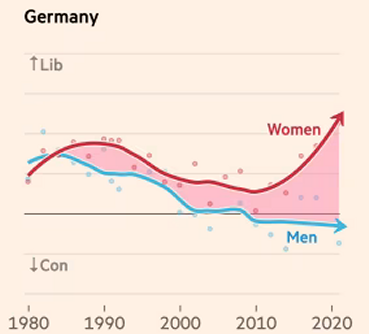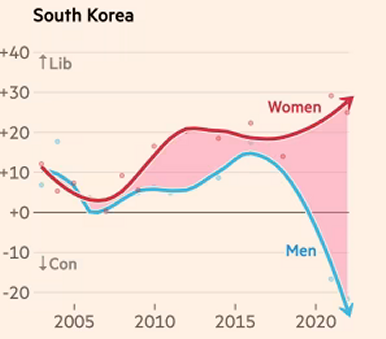Making the rounds today is a graph taken from the Financial Times, showing that there is a widening gap in political outlook, across the developed world, between males and females aged 18-29. The source article is here, but it’s paywalled, so I’ll sum it up for you: women are moving sharply to the left, while men are moving to the right.
Here, for example, is the graph for Germany:
And here’s South Korea:
The FT is aghast, but the only thing that’s surprising to me about this is that it’s taken this long. The triumph of feminism, the rapid ascension to power of women in the decades since the 60s, and the relentless feminization of every institution high and low, have had ample time now to show their destructive effect: not only on society as a whole (low wages, expansion of the welfare state, mass immigration, etc., would be nowhere near the problems they are today had all of this not happened), but also on women themselves, who consistently report declining happiness. (This is always referred to as a “paradox“, although there’s nothing at all paradoxical about radical social engineering, and wholesale disruption of natural and traditional roles, having unintended consequences.)
In particular, the intensifying effeminization of everything has, since the Great Awokening of a decade ago, led to increasingly strident denunciation of masculinity itself as a toxin to be flushed out of our social and political systems. I think that what’s happening here is a different kind of “awakening” — more in line with the actual meaning of the word, which connotes becoming conscious of reality again after sleeping and dreaming — in which young men are beginning to understand the consequences, both for themselves and the communities they live in, of this decades-long experiment in reinventing the world. (And, of course, after a while you also grow tired of being called out as a focus of evil just for being a guy, and you start wanting to push back a little. About time, fellas.)
We read:
Korea’s is an extreme situation, but it serves as a warning to other countries of what can happen when young men and women part ways. Its society is riven in two. Its marriage rate has plummeted, and birth rate has fallen precipitously, dropping to 0.78 births per woman in 2022, the lowest of any country in the world.
This has it exactly backward. Nobody who sees what should be self-evident to all would ascribe these low birthrates to the sexes “parting ways”; it is, rather, because we’ve made them too much alike. It’s the perfectly predictable effect of having spent decades turning everything upside down to make women be more like men, and men more like women. But just as with magnets, it’s the opposite poles that attract. This should be blindingly obvious! — but it stubbornly isn’t. (Here’s me, commenting on this ten long years ago.)
“But why”, you ask, “if things are indeed going so badly for everyone in the estrogen-drenched longhouse of our brave new world, are women doubling down, and getting even woker?”
I’ll leave that as “an exercise for the reader”.


One Comment
Meanwhile in other observed phenomena (as opposed to wishful/hopeful based “observational studies”) Other stuff appears to be taking a … um, er, hit?
https://www.heritage.org/environment/report/global-warming-observations-vs-climate-models
Of course it isn’t like we haven’t seen this before …
https://www.ncbi.nlm.nih.gov/pmc/articles/PMC7447267/
But lest we become complacent : 400 years of rising sea levels
https://imgur.com/8t606JZ
Aristophanes? Aristophanes?
Charge your phone buddy!